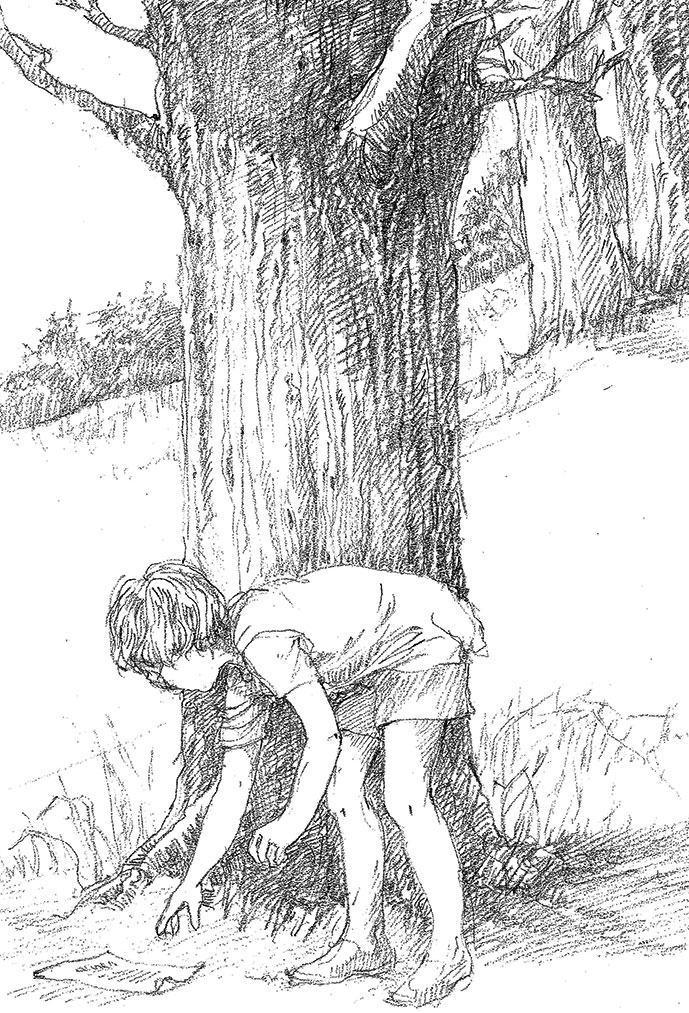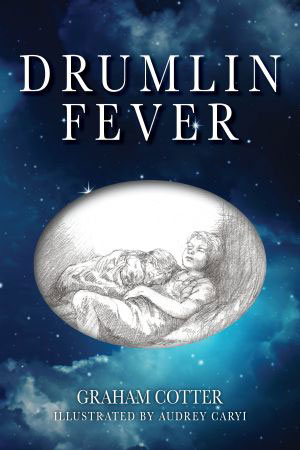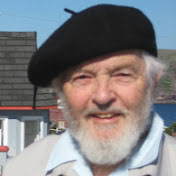Drumlin Fever
by Graham Cotter
Message on the Wind

Illustration by Audrey Caryi
Brian and Kevin had snatched something to eat and got out of the house well before the noise of cars had awakened their parents. Brian told Kevin the story of the buses and the little dog up the road, and Kevin sat looking out across the lowland from the sill of the barn where they sat, tears coming quietly down his cheeks.
“What’s wrong Kevin?”
“What do you suppose is wrong! I’m worried about the girls!”
Brian waited a moment, then he asked
“Is there anything special? Do you think you might know where they are?”
“Of course not, stupid! We looked every-where, didn’t we?”
Again Brian was thoughtful.
“No, not everywhere.”
“Well, since you’re so smart where didn’t we look?”
“We didn’t look at the toy village.”
“But Mom did!”
“Grown-ups don’t see things we see. They’re farther away!”
“They couldn’t be hiding there. If they’d fallen in the pool, we’d see them.”
He turned his head away in grief and anger.
“I s’pose. But that’s where we could start. I’ve got a feeling.”
“You and your feelings. Nuts. Where else haven’t we looked.”
“We haven’t looked down where I saw Bumsworthy and that other guy and we haven’t looked where you and Bart zapped those guys in the jeep.”
“They couldn’t be there!”
“Where?”
“Where the jeep was, stupid. We’d a seen ’em.”
“They mighta gone there after you left.”
“More likely down by the bulldozers. Those girls were always messing around where girls shouldn’t go.”
“Mum says where boys can go, girls can go.”
Kevin shoved his brother.
“You’re so smart. Whose side are you on, mine or theirs?”
“I just want to find them. So do you.”
“Okay, smarty pants. Let’s go.”
Brian ran after him.
“Kev..”
“Yeah?”
“We start with the toy village, okay?”
“Okay, for what good that’ll do.”
“Then you can go to the jeep place, and I’ll go to the bulldozers.”
“Okay.”
The toy village was as Kevin had left it. No alien smell remained. But Kevin recalled his clean-up and the questions he had been full of then.
“Brian?”
“Yeah”
“Remember the night before last?”
“No.”
Kevin looked at him. Brian was not fooling; he was looking carefully around the toy houses, and at the edges of the pool.
“Bri – an! We were out in the fog together!”
Kevin was feeling desperate. He knew he had shared the experience. Brian must be pretending.
“Kev, Kev, they were here! I found a peanut! Mum said she gave them peanuts!”
“So what? We know they were here. The thing is, where did they go from here?”
“And here’s a footprint in the mud!”
Kevin went over to his brother and shook him.
“You didn’t answer my question!”
“What question?”
“You and I were out in the fog and the rain together the night before last, and there … was… ice .. and thunder…”
“I was not with you! And there was no rain or fog that night! You’re crazy! You’re covering up something!”
He shook himself free from Kevin as tears began to come down his face. He rushed over to the edge of the village clearing, snatching a stone as he did so.
“You’ve done something to them – you always hated them!”
Brian rushed off, throwing the stone furiously – it nearly hit Kevin, who stood astonished, his anger drained away, abashed and ashamed. Brian was wrong: he had done nothing to the girls themselves. But Brian was also right; he had wished to often enough.
Kevin turned away from the village towards the neighboring field. As he had accused Brian of being with him, and spoke out his few words about that night, there had been an unreality to it; it had begun to seem like a dream. But now it seemed more real than ever, and the trees and the grasses which surrounded him seemed unreal, transparent. He stopped.
What was it? Something familiar, something that was a clue to the terrible night in the glacier. It was the smell, vile and putrid, the smell that had been on his own body. He could sense it distinctly, and even from a particular direction. It was coming across the field, from the direction of the clump of trees where he and Bart had harassed the men in the jeep.
********************
Debbie noticed the smell more too, as she danced with Linda along the base of the mountain. It was a strong burning smell, and reminded her of a story Daddy had told her. He had been putting her to bed one night when she wasn’t well, and she hadn’t liked the smell of the ointment he had rubbed on her.
“Daddy, tell me a story about when you were a little boy.”
“Would a story about when I was at sea do just as well?”
“Okay Daddy.”
“Well, during the war, we had to go way down the West Indies, and search the islands for submarines. The submarines were sinking ships and killing people. One day, we came to a lovely island, the second or third in a string of lovely islands that rise with high peaks out of the sea. The ships commander said to me
“Scace, do you see that hill over there with all the forts and guns on it?”
“Yes sir.” I said.
“That’s Brimstone Hill, a great fort in the past.”
“Why’s it called Brimstone sir?” I said.
“Just you wait, Scace,” he adds, “you’ll know as we pass close to it.”
Then do you know what happened?”
“What happened, Dada?”
“We went a little further, and there was this tremendous bad smell from the water, and the bubbles coming up. He said to me,
“That’s why it’s called Brimstone Hill…. all that sulphur coming up. It’s an old volcano. They say it could blow at any time.”
Debbie didn’t remember any more, because she got off to sleep, but it came back to her now: the great hill, the great smell. And the threat.
“It could blow up any time.”
She called to Linda, “Come Lindy, we must get behind the mountain! It could blow at any time!”
********************
Brian too noticed a smell, but it was a faint smell of gun powder. He knew this only from toy pistol caps, and wondered who could have been firing cap pistols since he last went along this road allowance. It was, anyway, only one of several smells which he noticed as he walked. It was nice to notice the smells without seeing, and he enjoyed them: sweet grasses, whiffs of manure from Letcherly’s barn, wild roses, and the after-smell when the lilac turned to seed. He was more interested in the earthy smells especially rotten wood, and paused just for a moment to look at his log of yesterday.
But he had more serious business to attend to. He had been shaken by the quarrel with his brother, though no sense of guilt attached to it: he had not picked the quarrel; Kevin had flared up because of his own mixed up character. And he was still convinced Kevin knew something which would help find the girls. Whatever it was, if the girls were not dead, or unconscious, or kidnapped, it must be extraordinary, because hunger alone would have brought one of them limping home, or crying, or something.
But Kevin was being strange. Brian had often noticed that as Kevin behaved, so behaved the family. If Kevin’s mood was difficult, Mum was difficult, Dad was silent, and the girls would tease worse than ever. Now Kevin’s mood was –
strange, nuts. There was something there Kevin could not focus on at all.
He soon reached the culvert and retraced his steps of yesterday. There was little reason to do so, from the point of view of “the enemy” because the Triple O people would not be working today: but Brian was looking for a clue. He found none till he reached the tree where he had hidden, like a prince among the rebels.
Then he saw some wrapping papers on the ground.
They said, “Danger! Explosives!” and on what would have been the other side when the explosives were inside “Dynamite!” At the same time he smelled the gunpowder more fiercely as a little wind came from the west.
********************
Many feet below, the waters pressed at the root of the great boulder like pop in a shaken bottle, or champagne ready to shoot its cork. The fuse was burning extraordinarily slowly, but it was within inches of the detonators which would explode the dynamite. Perhaps the ground was damp there, for unlike a good dry fuse, it smoked, and a little scarcely visible trail of smoke wound up through the trees into the branches of the big pine.
********************
Because of the Minster’s arrival, the procession had been diverted into the Warkworth Fair Grounds, and the meager food supplies which were waiting down in the cow pasture were rushed over to satisfy the starving crowd. Cynthia, still had the situation well in hand, and had diverted the children over into the fields where the stalls were in fair time. She had the OFY gang running games and doing tricks for various age groups, and even had the teenagers gathered round a display of martial arts, for Bart Cart had turned up, fresh from his morning’s judo in Scarborough. She had sent off for a record player and some records, knowing that oriental wrestling was not the kind of wrestling uppermost in the minds of the girls, at any rate.
The adults had been shepherded around the grandstand, and had been joined by the Warkworth Council and many notables from the village, all such as were not busy in their stores, or doing business as middle men to ferry candy and pop to the visitors. Here the loudhailer had been set up on a post as a makeshift PA system and the Mayor had just introduced the minister, the Honorable David Williams.
Williams was a short man, rather thick set; many people thought he was overweight, but this was an impression given by his square face. He was in his early forties, and showing little sign of greying or balding. He spoke in a flat way with little intonation or expression, a manner of speech which seemed a combination of the unflappability of the Western Ontario farmer, who knows that he had plentiful good land, and the dry tones of the Four Hundred of London, Ontario, who are afraid to sound emotional lest they sound like the other hundred and fifty-six thousand of their city.
“Thank you for your kind words of introduction, Mr. Mayor. I am greatly impressed with this community, from everything I have seen and heard about it before coming here, and now from what I have seen on this my first visit. Warkworth was already known among discerning eaters of Ontario cheese, long ago. Another level of Government had made Warkworth better known for a less tasteful reason, with the establishment of the penal institution. But we have to have such places, and the happy example of the pleasant community of Warkworth will inspire those who have to stay there to better lives, as, no doubt, the environment makes the prison officials who live in Warkworth pleasant to work under”
Truman McQoid leaned over to Garth Katting and said, in a stage whisper,
“Them ones inside are never the ones who need to be.”
Garth shifted uncomfortably.
“Today, in Warkworth, we have assembled together by a happy chance, the two great elements of our Ontario society, the rural people who are the backbone of our life, and the source of our daily bread – ”
“Backbone of the Conservative party, and source of your dough” muttered Hans .
” – and visitors from our great Metropolitan area of Toronto where industry and commerce have created communities of unparalleled beauty, cleanliness, and creativity. I would like all of you, from both these elements in our society, to know that your government in Ontario had the interests of both elements at heart, and will continue to balance the needs of both for planning and legislation. We believe that our government has, over more than thirty years, richly deserved the confidence repeatedly placed in us – ”
“by Fidelium or Nautilus,” Hans words were just audible.
” – by the people of Ontario. When I first was invited to address the visitors to the Own your Own Ontario Corporation Development I did not know that I would have to bear some disquieting news to you. Though I am sure, Mr. Bondworthy, that your visitors today will want to invest in such lovely countryside, I have received news just this morning from the Chief Justice that the titles you have given to those purchasing previous to now cannot be regarded as legal -”
There was a gasp from Bondworthy, Katting and several others. But the majority were not affected, either because they had come along for the ride, or because the Minister had effectively stopped them thinking in the first four sentences.
“- before anyone gets alarmed, and before there is unwarranted confusion.”
Todeski was on the edge of the crowd, having been doing his weekly shopping in Warkworth, and hoping to stay on for the Donnybrook.
“Confusion” he thought, “What does that remind me of?”
“I want you all to know, that after talking with Mr. Hagerman this morning, I have decided to ask the Prime Minister and the Cabinet for special legislation which will permit municipalities to pass suitable by-laws which will legitimize such title deeds. There should not be any embarrassment to any of our friends who have invested time and trouble in this enterprise. I am told that the local organizers have arranged for the annual Donnybrook auction to take place a little earlier than usual today so that the visitors will be well occupied, and the local good people can get to know you better.”
“We know them quite well enough, thank you.” Cynthia said, less loudly than her father but loud enough to be heard.
“So, such developments are really in the best interest of both the urban and rural segments of the population, I trust that when the appropriate moment comes, Mr. Mayor, you and your Council will not refuse – ”
“Fuse!” shouted Todeski, “My fuse! Mr. Bondworthy. My fuse is lit since yesterday!”
He rushed up to the platform and dragged Bondworthy to him.
“It will go off now anytime, and there will be no sign to keep the people away!”
Todeski was shrieking, pushing his way through the crowd with a breathless Bondworthy.
“Good heavens! ” said the Minister of Municipal Affairs, his voice continuing to boom over the loud hailer, along with less printable remarks from people around him annoyed at the interruption.
“Oh, said the Mayor, “The girls, my brother’s children!”
With the word “children” booming across the fairground another and larger sound was heard, a great explosion from beyond town and the bypass, from the site of the Triple O Lodge.
Drumlin Fever is now Available for Sale
Great News! Drumlin Fever has now been published. (Sept 2020)

The cost is $20 + $8 shipping and handling if delivered within Canada.

